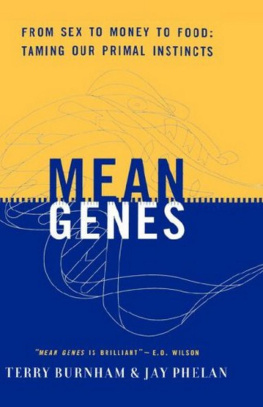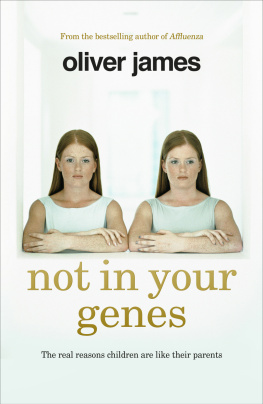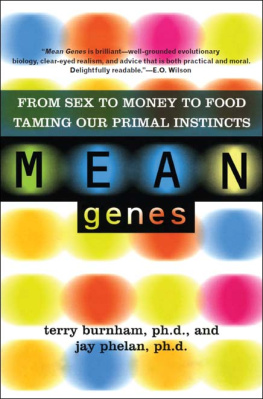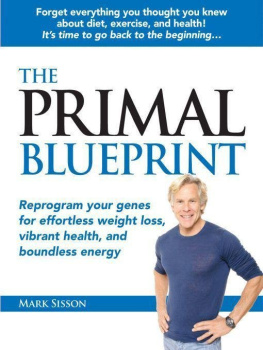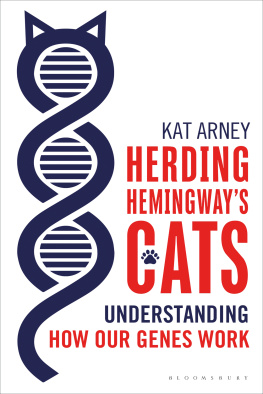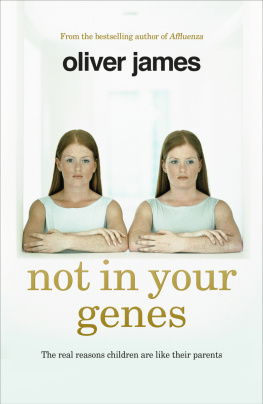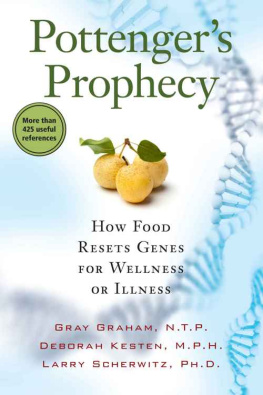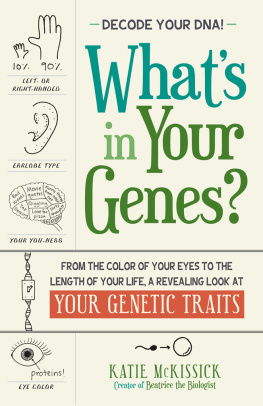MEAN GENES
From sex to money to food Taming our primal instincts
TerryBurnham and Jay Phelan
Copyright 2000 by Terry Burnhamand Jay Phelan
Penguin (Non-Classics) 1st edition
ISBN: 0-7382-0230-4
Contents
Introduction Our toughest battles are with ourselves1
THIN WALLETS AND FAT BODIES
Debt Laughing all the way to the Darwinian bank 15
bankruptcy savings big business
Fat Please don't feed the humans 35
dieting laziness liposuction
CONSTANT CRAVINGS
Drugs Hijacking the pleasure pathway 59
caffeine alcohol prozac addiction hope
Risk Thrill-seeking genes taking us for a ride 83
casinos jalapeno peppers roller-coasters rewards
Greed Running fast on the happiness treadmill 105
money happiness materialism progress joy
ROMANCE AND REPRODUCTION
Gender Girls against the boys 131
mars venus hormones homosexuality culture
Beauty It's more than skin deep 153
attraction desire fads
Infidelity Our cheating hearts 173
marriage cheaters love lust promise
FAMILY, FRIENDS, AND FOES
Family The ties that bind 199
blood siblings conflict motherhood
Friendsand Foes Keep friends close and enemiescloser 213
warfare race gossip road rage loyalty
Conclusion Surviving desire 245
Acknowledgments
Index
Introduction: Our toughest battles are withourselves
Consider this book an owner's manualfor your brain.
Most of us would feel cheated if webought a car or a microwave and it came without instructions. But our mostimportant possessions body and mind come with no such guide, leaving ussearching haphazardly for satisfaction: a dollop of exercise, thirteen minutesof sex, a "Happy Meal," a cocktail, and a sport-utility vehicle. MeanGenes offers the missing information that can help us take better controlof our lives.
When we drive a car or operate amicrowave, our orders are carried out exactly as we command. The machinedoesn't talk back or have an agenda of its own at least not yet. On the otherhand, if we tell our brain, as part of a New Year's resolution, to cut down onfatty foods, it most likely will let out a hearty laugh and continue to set offbells and whistles of approval when the dessert cart rolls around.
Our brain, for better or worse, isnot an obedient servant. It has a mind of its own. Imagine that you areactually two things: a personality who has likes, dislikes, desires, anddreams. But inside your body there is also a "machine," your brain,that processes commands and acts on those likes, dislikes, desires, and dreams.It fights you all the time. And it usually wins.
Why can't the two of you see eye toeye? Why do we have battles over controlling our own behavior? And why arethese battles so hard to win? Are cats and dogs obsessed with fightingaddictions, controlling their weight, and remaining faithful to their mates? Dochimpanzees regularly resolve to be less selfish?
In a creepy campfire legend, ababysitter alone in a house receives increasingly menacing phone calls.Terrified, she contacts the police, who put a tap on her phone. After theboogieman calls again, the cops frantically phone her, screaming, "We'vetraced the call. It's coming from inside the house! Get out!"
Similarly, the source of ourself-control problems lies within us, in our genes. But we can't get out orleave them behind. Manipulative media, greedy businesses, and even our friendsand family play roles in nurturing our demons. Still, most of our self-controlproblems stem from our impulses to do things that are bad for us or for thosewhom we love.
A visit to any bookstore reveals thenature of our struggles. Glancing at the bestsellers, we can see what's onpeople's minds. There are dozens of books on finding love, losing weight, andcreating wealth. Conspicuously absent are a host of other topics. Where are thebooks entitled How to Build a Bigger Beer Gut, Ten Steps to FrivolousSpending, or Nurturing the Infidel Within? Why do some behaviorscome so naturally while others require so much effort? It's because our genespredispose us to certain failings.
Every day we see headlines heraldingdiscoveries of "the gene for alcoholism" or "the genes ofaging." These reports make an obvious point: human biology and disease areinfluenced in important ways by our genes. The Human Genome Project, which willsoon determine the sequence of every stretch of DNA in the human body, is arevolution in the making. With each passing week, scientists unearth thegenetic roots of more and more diseases, and the promise of future cures growsstronger.
But genetic effects are far morepervasive than these articles suggest. Even in areas where we feel that we actpurely of our own free will, our dramas are played out on a genetic stage. Overthe last few decades, scientists have learned a great deal about the structureof this stage, and our learning will accelerate with the forthcoming genomicadvances. Throughout Mean Genes, we explore what we know about thesegenetic influences and what they mean for our daily lives. Let us entice youwith one example:
What is beauty and who sets thestandards? It's a complex question, and many before us have tried to answer it.Some have suggested that beauty is mysterious or divine, incapable ofcomprehension by mere mortals.
Others believe that beauty isdefined by the society we live in: whatever the fashion industry deemsattractive is considered beautiful by the public at large. But if this weretrue if beauty were truly governed by fads or trends wouldn't every culturehave its own definition of beauty? This is not the case.
Careful observation of humansymmetry shows us why. The two halves of our body mirror each other. Our righthand, for example, is structured exactly like our left hand. The mirroring isnot perfect, though, and each of us is aware of our minor deviations fromcomplete symmetry one ear may be a bit lower, one breast slightly larger,etc.
We find symmetrical peoplebeautiful, even if they are not "classically" attractive. Inscientific studies, both women and men show a clear and dramatic preference forsymmetrical partners over more lopsided lovers. Furthermore, women who recordeddetails of their sex lives revealed an interesting pattern: they were much morelikely to reach orgasm and more likely to become pregnant during intercoursewith symmetrical men.
The symmetry data are more than justa tantalizing tale: across the animal kingdom, symmetry is a sign of healthy,disease-free bodies, likely to have been built by a good set of genes. Althoughmost of us cannot assess someone's symmetry, it guides our mating decisionsunconsciously.
So there is a logic to our aestheticpenchant for symmetrical people logic that only a gene could love, logic thatcan be understood only by looking at ourselves in the broader context ofevolution and animal behavior. Doing so reveals that our brain does havean agenda, but this agenda need not remain a mystery.
Our brains have been designed bygenetic evolution. Once we understand that design, it is no longer surprisingthat we experience tensions in our marriages, that our waistlines are biggerthan we'd like, and that Big Macs are tastier than brown rice. To understandourselves and our world, we need to look not to Sigmund Freud but rather toCharles Darwin.
Like it or not, we are each engagedin a battle against our own set of mean genes. They are wily opponents, too.Masters of the visceral, they control through satisfaction, pain, and pleasure.
Even the most successful peoplesuccumb. Look at Oprah Winfrey, for instance. She runs a powerful media empireand is reportedly closing in on billionaire status. Her long list ofaccomplishments includes seven Emmy awards, an Oscar nomination, and a beautyqueen crown. Rich and influential, this exceptional person is also veryordinary in one respect. Along with the rest of us, Oprah struggles forself-control.

